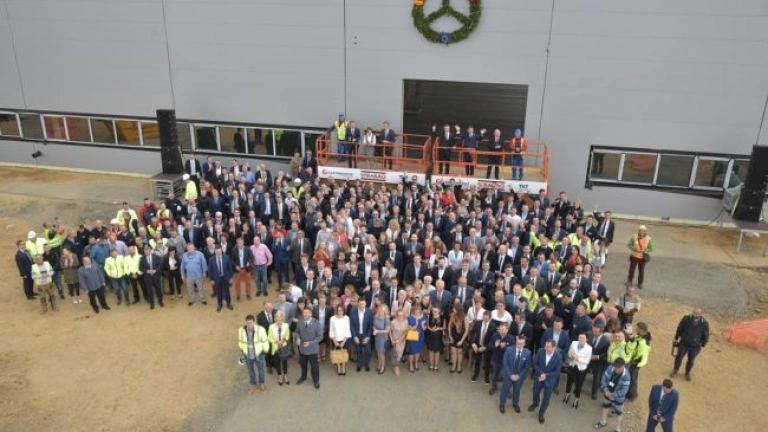Topping out at the Mercedes-Benz factory in Jawor. The company announces an increase in employment

Mercedes-Benz Cars celebrated the next stage of the construction of its engine factory in Poland on 22 June, a garland shaped three-pointed star was suspended from the finished production and assembly hall. The official topping-out ceremony was attended by, among others: Jadwiga Emilewicz, Minister of Entrepreneurship and Technology, Markus Schäfer, Member of the Divisional Board of Mercedes-Benz Cars, Production and Supply Chain, Frank Deiß, Head of Production Powertrain Mercedes-Benz Cars, Rainer Ruess, Head of production planning Mercedes-Benz Cars, Dr. Andreas Schenkel, CEO of Mercedes-Benz Manufacturing Poland, as well as many guests from the world of business, politics, science and culture.
The company has decided to create an additional 500 jobs, which is a response to the ever-growing demand for technologically advanced four-cylinder power units. – In our CO2-neutral plant in Jawor, we will be build highly efficient engines for our hybrid vehicles and conventionally powered passenger cars. The construction of this plant is an investment in the future and an inportant milestone on our way to the mobility of the future. This is a strong signal of our involvement in the location and of Polish-German friendship. – said Markus Schäfer, Member of the Divisional Board of Mercedes-Benz Cars, Production and Supply Chain.
The production area of the facility is 180,000 m², more than 40,000m² originally planned, and the plant is located on 50 hectares. The factory will employ over 1,000 people, which will allow the company to increase the production capacity of the global Mercedes-Benz Cars network .
Jadwiga Emilewicz: – The automotive industry is a key branch of Polish industry and that is why it is very good that a company with such a long tradition and prestige has decided to launch a production of engines in our country. It is said that the engine is the heart of the car. Soon, a large part of the hearts of German cars will come from Poland. The investment of Daimler AG certainly contributes to strengthening trade relations between Poland and Germany. It is also a good basis for joint activities for the development of automotive technology.
The factory in Jawor, as one of the first, will be neutral in terms of CO2 emissions. 100 percent of the electricity used by the factory will come from renewable sources. – A self styled greenfield project, a new engine factory in Jawor offers an excellent opportunity to establish an integrated production concept on a newly built site. Jawor will be our benchmark regarding green high-tech production. It is of course a challenge to transfer the same measures into existing, historically grown factories in our powertrain production network, but it is our aim to implement as many as possible, using Jawor to test feasibility. – stated Frank Deiß, Head of Production Powertrain Mercedes-Benz Cars.
Industry 4.0 applications such as a real-time management information system and digital shop floor management will play an important role in the new engine factory. Within logistics, driverless transport systems will be used to transport materials, which can be tracked and traced at all times using RFID (Radio Frequency Identification), making physical inventory unnecessary. Other measures planned are the use of Augmented Reality and Big Data analyses to support the employees during the assembly processes, avoid errors at an early stage and prevent machine failures. The goal is to also become paperless in production and in administrative areas.
– In our new engine factory in Jawor we will be setting standards in the area of Industry 4.0. This will result in efficient and flexible production processes and ergonomic workplaces – said Dr. Andreas Schenkel. – Cooperation with Polish politicians is excellent along with local authorities, general contractors and our competent, motivated employees, both in Poland and in Germany. Currently, more than 900 people are working here on the construction site. All this to start production of highly efficient and high-quality Mercedes-Benz engines in 2019.
Mercedes-Benz Cars Operations is responsible for passenger car production at over 30 locations around the world. Three of them are currently being established. Within a flexible and efficient production network with around 78,000 employees it includes the central functions of production planning, TecFactory, logistics, and quality. Mercedes-Benz Cars produced more than 2.4 million Mercedes-Benz and smart passenger cars last year, marking the seventh record in a row. The network is based on the product architectures of front-wheel drive (compact cars) and rear-wheel drive (for example the S-Class, E-Class, and C-Class) as well as the SUV and sports car architectures. In addition there is a powertrain production compound (engines, transmissions, axles and components). Each of these production compounds is grouped around a lead plant that serves as a center of competence for the ramp-up of new products, technology and quality assurance. Mercedes-Benz Cars is ready for the electro mobility: Around the globe electro hubs are built for the production of electric vehicles and batteries. The focus of day-to-day work is on the continuous improvement and refinement of state-of-the-art production methods, which allow future high-tech vehicles to be produced in a way that is efficient, flexible and environmentally friendly, according to the typical Mercedes-Benz quality standards. All of this revolves around the employees and their expertise, whose work is systematically supported by ergonomic workplace design and intelligent automation.